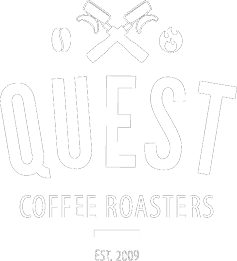We all want our daily brew to do some good. Coffee bags often carry labels like Fairtrade or Rainforest Alliance, but what do they actually mean for farmers, the environment, and quality? Here’s a clear, updated guide to both certifications and how we think about them at Quest Coffee Roasters.
Quick summary
- Fairtrade focuses on minimum prices, a fixed premium paid to producer organisations, and strong labour protections.
- Rainforest Alliance focuses on environmental and social practices (biodiversity, climate, human rights) and requires buyer payments called Sustainability Differential and Sustainability Investments, but no fixed minimum price.
Why certifications matter
Most of the world’s coffee is grown by smallholder farmers who face volatile prices and climate pressure. Credible certification can improve incomes, strengthen worker protections, and reduce environmental harm through better farm management and traceability systems.
Fairtrade coffee (what it means)
- Price floor: Fairtrade sets a Minimum Price for green coffee to help protect farmers when market prices fall. As of 1 August 2023, the Minimum Price for washed Arabica is US$1.80/lb. There is also an Organic Differential and a fixed community Premium.
- Labour & human rights: Fairtrade Standards prohibit child labour and require systems to prevent and address abuses; no certification can guarantee 100% absence, but Fairtrade has remediation protocols when issues are found.
- Producer impact: Fairtrade links pricing with living income benchmarks in some origins and is regularly reviewed to reflect costs of sustainable production.
Common misconceptions corrected
- “Fairtrade guarantees any quality regardless of price.” Quality still determines whether buyers will purchase; the Minimum Price is a safety net, not a guarantee of sale.
Rainforest Alliance Certified coffee (what it means)
- Environmental & social focus: Standards cover biodiversity, climate-smart practices, soil and water protection, and human rights due diligence (including risk-based approaches to child and forced labour).
- Payments to farmers: The program requires buyers to provide a Sustainability Differential (cash payment) and Sustainability Investments (funding for improvements). It does not set a fixed minimum farmgate price.
- Seal usage today: For most single-ingredient products (like coffee), products using the new frog seal must contain at least 90% certified ingredient (different thresholds apply to a few categories like herbal teas). Older “30% content” rules were retired years ago.
- Child labour approach: Risk assessment, prevention, and remediation guidance is built into the 2020 Certification Program.
Common misconceptions corrected
- “Rainforest Alliance pays a fixed daily wage (e.g., $2/day).” Incorrect. RA sets standards and due-diligence requirements and mandates SD/SI payments from buyers; it does not impose a universal wage rate.
Fairtrade vs Rainforest Alliance: which is “better”?
They solve different parts of the same problem:
- If you care most about price stability for farmers: Fairtrade’s Minimum Price + Premium model is the clearest mechanism.
- If you care most about environmental practices at origin: Rainforest Alliance has detailed biodiversity and climate-smart requirements plus human rights due diligence.
In practice, many buyers (including us) consider both approaches and, where possible, pay quality-based premiums on top of certification requirements to reward exceptional lots.
How we source at Quest Coffee Roasters
We carefully select origins and partner mills based on cup quality, traceability, and sustainability credentials. You’ll see Fairtrade and Rainforest Alliance Certified options featured across our single origins and blends from time to time. Certifications aren’t the only signal of ethics or quality, but they’re useful tools – especially when paired with direct relationships and transparent pricing.
FAQs
Does certification guarantee “child-labour-free” coffee?
No system can promise a 100% guarantee. Both Fairtrade and Rainforest Alliance prohibit child labour and require prevention and remediation when risks are identified.
Is Rainforest Alliance “Fairtrade lite”?
That nickname is outdated and oversimplified. The current RA program (launched in 2020) uses SD/SI payments, risk-based human rights due diligence, and stricter rules on seal usage (generally 90% certified content for single-ingredient products).
What about quality?
Neither label guarantees flavour. Quality comes from cultivar, terroir, processing, and roasting. Certifications can support better farming and livelihoods, which often correlates with better quality, but we still cup every lot.
Bottom line
Both certifications add value in different ways. Fairtrade provides a safety net on price; Rainforest Alliance drives environmental and social improvements with buyer co-investment. Choosing certified coffees – and paying attention to roaster transparency – helps build a more sustainable coffee future.
Come and chat with us at Quest Coffee Roastery in Burleigh Heads about our current certified single origins, or enjoy a cup in-store knowing we’re sourcing with care.


